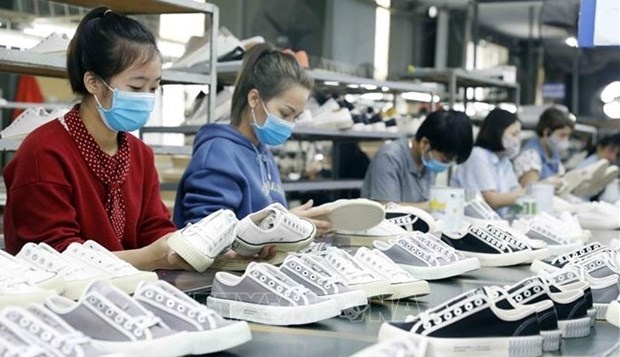Employee ire intensifies with insufficient remuneration and working conditions
 |
| Employee ire intensifies with insufficient remuneration and working conditions, Illustrative image (Source: VNA) |
Nguyen Thi Quynh, a worker in a garment company in Dan Phuong district of Hanoi, makes a monthly income on average of VND6.5 million ($282), which is just enough for her to make a living and save a little bit of money.
“I am single but I still have to live economically to have a savings account. At my company, the life of the majority of workers remains difficult. Most workers want to work overtime because basic wages are not enough, and some even have to send their children back to their hometowns to save money,” Quynh said.
Statistics published by the Vietnam General Confederation of Labour showed that, in the first two months of this year, there were nearly 30 strikes over poor salaries across a dozen cities and provinces, almost all in garments and footwear businesses.
Around 5,000 workers at Taiwan-owned footwear group Viet Glory Co., Ltd. and up to 16,000 workers at Taiwanese-invested footwear maker and Nike contractor Pou Chen Vietnam went on strike during this time.
Employees have complained that the companies’ remuneration packages are not comparable to those of other places, with unreasonable deductions, but there remains work pressure and high sales targets even though wages remain unchanged.
Workers have also told local media that during the pandemic they have shared the sufferings of their businesses by accepting salary cuts, reducing working hours, rotating breaks, or working overtime. However, many believed the situation has improved enough for increases, especially in Lunar New Year bonuses, but said the businesses are not using a portion of their revenues to pass onto the workers.
Le Dinh Quang, deputy head of Policy and Law at the Vietnam General Confederation of Labour, said that the wage of workers in the garment and footwear sector is less competitive compared to the wages in other sectors, and the pandemic has not helped.
“In the past two years, the minimum wage has not been adjusted and will not be adjusted in 2022 either, making the situation somewhat of a deadlock. The difficulties are even more so now because of the increase in gasoline prices leading to a rise in a series of other commodities,” Quang said.
The Ho Chi Minh City Confederation of Labour and Vietnam National University have meanwhile reported the results of a survey to assess the current status of employment and life of female workers in the city. The survey approached 1,774 female garment workers, business representatives, and trade union officials.
The survey results showed that the average monthly income of the garment industry is around $295 per person, with workers heavily dependent on overtime to improve incomes. Around 42 per cent of female workers think with the current income level, their families have a poor standard of living; 36 per cent of them think that their income is enough to make a living.
Annabel Meurs, manager of the Fair Wear Foundation in Vietnam, believed there is a wider global perspective to the issue. “There are many reasons for paying an unliving wage for workers,” Meurs said.
“There may be an underdeveloped collective bargaining model, a fragmented responsibility of brands with various production places, or a brand that works for a number of labels. But one of the key reasons is that brands are not involved in wage calculation and labour costs are not included in the price negotiation process,” he said.
What the stars mean:
★ Poor ★ ★ Promising ★★★ Good ★★★★ Very good ★★★★★ Exceptional
Related Contents
Latest News
More News
- State corporations poised to drive 2026 growth (February 03, 2026 | 13:58)
- Why high-tech talent will define Vietnam’s growth (February 02, 2026 | 10:47)
- FMCG resilience amid varying storms (February 02, 2026 | 10:00)
- Customs reforms strengthen business confidence, support trade growth (February 01, 2026 | 08:20)
- Vietnam and US to launch sixth trade negotiation round (January 30, 2026 | 15:19)
- Digital publishing emerges as key growth driver in Vietnam (January 30, 2026 | 10:59)
- EVN signs key contract for Tri An hydropower expansion (January 30, 2026 | 10:57)
- Vietnam to lead trade growth in ASEAN (January 29, 2026 | 15:08)
- Carlsberg Vietnam delivers Lunar New Year support in central region (January 28, 2026 | 17:19)
- TikTok penalised $35,000 in Vietnam for consumer protection violations (January 28, 2026 | 17:15)

 Tag:
Tag:




















 Mobile Version
Mobile Version